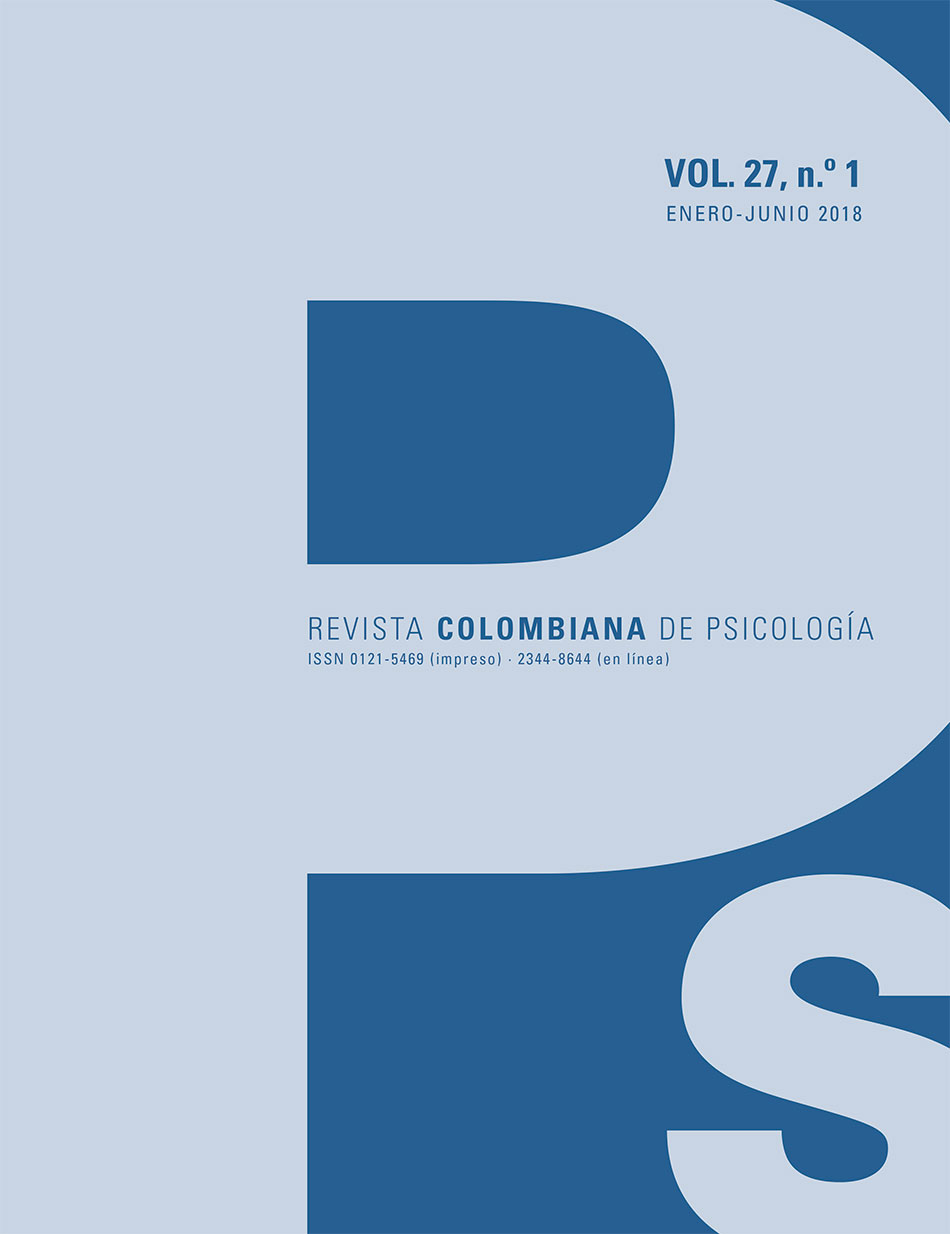Parenting Styles and Dimensions Questionnaire – Adaption of the Observer Reporting Version to the Portuguese Population
Parenting Styles and Dimensions Questionnaire — Adaptación de la Versión Portuguesa de Heteroinforme
Parenting Styles and Dimensions Questionnaire — Adaptação da Versão Portuguesa de Heterorrelato
DOI:
https://doi.org/10.15446/rcp.v27n1.64621Keywords:
democratic parental style, authoritarian parental style, permissive parental style, PSDQ, developmental psychology (en)estilo parental democrático, estilo parental autoritario, estilo parental permisivo, PSDQ, psicología del desarrollo (es)
estilo parental democrático, estilo parental autoritário, estilo parental permissivo, PSDQ, psicologia do desenvolvimento (pt)
Downloads
This study aimed to analyze the psychometric properties of the Parenting Styles and Dimensions Questionnaire (PSDQ) and adapts its observer reporting version to the Portuguese population. The sample consisted of 604 adolescents 15 to 18 years old (M=15.99, SD=.97). Reliability as measured by Cronbach’s alpha revealed indices of .86/.81 for the totality of the instrument in the father and mother version respectively, with indices that varied between .48/.85 for the respective subscales. The Confirmatory Factor Analysis indicated mismatched values for the goodness of fit indices. The analysis of principal components study confirmed the original structure of the instrument organized in three factors that revealed the presence of a permissive item saturating into another factor. Semantic analysis of this item and its respective reor-ganization verified adequate goodness of fit indices. The new factor structure of the PSDQis proposed as more adjusted to the Portuguese culture.
How to cite this article:
Nunes, F., & Mota, C. (2018). Parenting Styles and Dimensions Questionnaire – Adaption of the Observer Reporting Version to the Portuguese Population. Revista Colombiana de Psicología, 27(1), 117-131. doi:https://doi.org/10.15446/rcp.v27n1.64621
El presente estudio busca analizar las propiedades psicométricas del Parenting Styles and Dimensions Questionnaire (PSDQ) y adaptar su versión de heterorrelato a la población portuguesa. La muestra se constituyó por 604 adolescentes con edades entre los 15 y los 18 años (M=15.99, DP=.97). La fiabilidade se evaluó por medio del alfa de Cronbach, que reveló índices de .86/.81 para la totalidad del instrumento en la versión del padre y de la madre respectivamente, e índices que variaron entre .48/.85 para las respectivas subescalas. El análisis factorial confirmatorio evidenció que los índices de ajustamiento presentaron valores desajustados. Se confirmó la estructura original del instrumento organizada en tres factores mediante los análisis de componentes principales que revelaron la presencia de un ítem del estilo permisivo a saturar en otro factor. Por medio del análisis semántico de este ítem y su respectiva reorganización, se verificaron índices de ajustamiento adecuados. Se plantea la nueva estructura factorial del PSDQ porque se considera que es más ajustada a la cultura portuguesa.
Cómo citar este artículo:
Nunes, F., & Mota, C. (2018). Parenting Styles and Dimensions Questionnaire — Adaptación de la Versión Portuguesa de Heteroinforme. Revista Colombiana de Psicología, 27(1), 117-131. doi:https://doi.org/10.15446/rcp.v27n1.64621
O presente estudo procura analisar as propriedades psicométricas do Parenting Styles and Dimension Questionnaire (PSDQ) e adaptar para a população portuguesa a sua versão de heterorrelato. A amostra foi constituída por 604 ado-lescentes com idades entre os 15 e os 18 anos (M=15.99, DP=.97). A confiabilidade foi avaliada através do alfa de Cronbach, que revelou índices de .86/.81 para a totalidade do instrumento na versão do pai e da mãe respetivamente, e índices que variaram entre .48/.85 para as respetivas subescalas. A análise fatorial confirmatória evidenciou que os índices de ajustamento apresentaram valores desajustados. Confirmou-se a estrutura original do instrumento organizada em três fatores mediante as análises de componentes principais que revelaram a presença de um item do estilo permissivo a saturar noutro fator. Através da análise semântica deste item e da sua respetiva reorganização, verificaram-se índices de ajustamento adequados. Propõe-se a nova estrutura fatorial do PSDQpor se considerar que é mais ajustada à cultura portuguesa.
References
Bandalos, D. L., & Finney, S. J. (2001). Item parceling issues in structural equation modeling. Em G. A. Marcoulides, & R. E. Schumacker (Eds.), Advanced structural equation modeling: New developments and techniques.Mahwah, NJ, EUA: Lawrence Erlbaum
Associates, Inc.
Baumrind, D. (1968). Authoritarian vs. authoritative control. Adolescence, 3, 255-272.
Baumrind, D. (1991). Parenting styles and adolescent development. Em J. Brooks-Gunn, R. Lerner, & A. C. Petersen (Eds.), The encyclopedia on adolescence (pp. 746-758). Nova York, EUA: Garland.
Benetti, C., Pizeta, A., Schwartz, B., Hass, R. A., & Melo, L. (2010). Problemas de saúde mental na adolescência: características familiares, eventos traumáticos e violência. Psico-usf, 15, 321-332. https://doi.org/10.1590/S1413-82712010000300006
Cronbach, L. (1951). Coefficient alpha and the internal structure of tests. Psychometrika, 16, 297-334.
Darling, N., & Steinberg, L. (1993). Parenting style as con-text: An integrative model. Psychological Bulletin, 113, 487-496. https://doi.org/10.1037/0033-2909.113.3.487
Ducharne, M. A. B., Cruz, O., Marinho, S., & Grande, C. (2006). Questionário de estilos educativos parentais (QEEP). Psicologia e Educação, 5, 63-75.
Gomide, P. I. C. (2006). Inventário de estilos parentais. Modelo teórico: manual de aplicação, apuração e interpretação. Petrópolis, Brasil: Vozes.
Greening, L., Stoppelbein, L., & Luebbe, A. (2010). The moderating effects of parenting styles on African-American and caucasian children’s suicidal behaviors. Journal Youth Adolescence, 39, 357-369. https://doi.org/10.1007/s10964-009-9459-z
Hambleton, R. K. (2005). Issues, designs and technical guidelines for adapting tests into multiple languages and cultures. Em R. K. Hambleton, P. F. Merenda, & C. D. Spielberger (Eds.), Adapting educational and psychological tests for cross-cultural assessment (pp. 3-38). Mahwah, NJ, EUA: Erlbaum.
Jonyniene, J., & Kern, R. M. (2012). Individual psychology lifestyles and parenting style in lithuanian parents of 6-to 12-year-olds. International Journal of Psychology, 11, 89-117. https://doi.org/10.7220/1941-7233.11.5
Kajula, L. J., Darling, N., Kaaya, S. F., & de Vries, H. (2016). Parenting practices and styles associated with adolescent sexual health in Dar es Salaam, Tanzania. AIDS Care, 28,1467-1472. https://doi.org/10.1080/09540121.2016.1191598
Kazemi, A., Ardabili, H. E., & Solokian, S. (2010). The association between social competence in adolescents and mothers’ parenting style: A cross sectional study on iranian girls. Child and Adolescent Social Work Journal, 27,395-403. https://doi.org/10.1007/s10560-010-0213-x
Lee, E. H., Zhou, Q., Ly, J., Main, A., Tao, A., & Chen, S. H. (2013). Neighborhood characteristics, parenting styles, and children’s behavioral problems in Chinese American immigrant families. Cultural Diversity and Ethnic Minority Psychology, 20, 1-11. https://doi.org/10.1037/a0034390
Liem, J. H., Cavell, E. C., & Lustig, K. (2010). The influence of authoritative parenting during adolescence on depressive symptoms in young adulthood: Exami-ning the mediating roles of self-development and peer support. The Journal of Genetic Psychology, 171, 73-92. https://doi.org/10.1080/00221320903300379
Locke, L. M., & Prinz, R. J. (2002). Measurement of parental discipline and nurturance. Clinical Psychology Review, 22, 895-930. https://doi.org/10.1016/S0272-7358(02)00133-2
MacCallum, R. C., Widaman, K. F., Preacher, K. J., & Hong, S. (2001). Sample size in factor analyses: The role of model error. Multivariate Behavioral Research, 36, 611-637. https://doi.org/10.1207/S15327906MBR3604_06
Maroco, J. (2010). Análise de equações estruturais: fundamentos teóricos, software & aplicações. Pêro Pinheiro, Portugal: Report Number.
Miguel, I., Valentim, J. P., & Carugati, F. (2009). Questionário de Estilos e Dimensões Parentais — Versão Reduzida: adaptação portuguesa do Parenting Styles and Dimensions Questionnaire–short form. Psychologica, 51,169-188. https://doi.org/10.14195/1647-8606_51_11
Nyarko, K. (2011). The influence of authoritative parenting style on adolescents’ academic achievement. American Journal of Social and Management Sciences, 2, 278-282. https://doi.org/10.5251/ajsms.2011.2.3.278.282
Olivari, M. G., Wahn, E. H., Maridaki-Kassotaki, K., Antonopoulou, K., & Confalonieri, E. (2015). Adolescent perceptions of parenting styles in Sweden, Italy and Greece: An exploratory study. Europe’s Journal of Psychology, 11,244-258. https://doi.org/10.5964/ejop.v11i2.887
Olivary, M. G., Tabliabue, S., & Confalonieri, E. (2013). Parenting style and dimensions questionnaire: A review of reliability and validity. Marriage & Family Review, 49,465-490. https://doi.org/10.1080/01494929.2013.770812
Önder, A., & Gülay, H. (2009). Reliability and validity of Parenting Styles & Dimensions Questionnaire. Procedia Social and Behavioral Sciences, 1, 508-514. https://doi.org/10.1016/j.sbspro.2009.01.092
Pedro, M. F., Carapito, E., & Ribeiro, T. (2015). Parenting Styles and Dimension Questionnaire — versão portuguesa de autorrelato. Psicologia Reflexão e Crítica, 28, 302-312. https://doi.org/10.1590/1678-7153.201528210
Robinson, C. C., Mandleco, B., Olsen, S. F., & Hart, C. H. (1995). Authoritative, authoritarian, and permissive parenting practices: Development of a new measure. Psychological Reports, 77, 819-830. https://doi.org/10.2466/pr0.1995.77.3.819
Sangawi, H., Adams, J., & Reissland, N. (2016). The impact of parenting styles on children developmental outcome: The role of academic self-concept as a mediator. International Journal of Psychology, 1, 1-9. https://doi.org/10.1002/ijop.12380
Schumacker, R. E., & Lomax, R. G. (2004). A beginner’s guide to structural equation modeling (2a ed.). Mahwah, NJ, EUA: Lawrence Erlbaum Associates.
Silva, J. C., Morgado, J., & Maroco, J. (2012). The relationship between portuguese adolescent perception of parental styles, social support, and school behaviour. Psychology, 3, 513-517. https://doi.org/10.4236/psych.2012.37074
Tavassolie, T., Dudding, S., Madigan, A. L., Thorvar-darson, E., & Winsler, A. (2016). Differences in perceived parenting style between mothers and fathers: Implications for child outcomes and marital
sonflict. Journal of Child and Family Studies, 25, 2055-2068. https://doi.org/10.1007/s10826-016-0376-y
Yuan, K. H. (2005). Fit indices versus test statistics. Multivariate Behavioral Research, 40, 115-148. https://doi.org/10.1207/s15327906mbr4001_5
Yusuf, M. S., & Sim, C. C. (2016). Relationship between parenting satisfaction and parenting styles of working mothers in a university in Malaysia. Jurnal Psikoislamedia, 1, 279-289.
How to Cite
APA
ACM
ACS
ABNT
Chicago
Harvard
IEEE
MLA
Turabian
Vancouver
Download Citation
CrossRef Cited-by
1. Catarina Pinheiro Mota, Sandra de Assunção. (2020). Estilos parentais e comportamento desviante: papel mediador do consumo de álcool em estudantes universitários. Suma Psicológica, 27(2), p.98. https://doi.org/10.14349/sumapsi.2020.v27.n2.4.
2. Inês Carvalho Relva, Margarida Simões, Mónica Costa, Ana Pacheco, Mariagiulia Galuzzo. (2024). The Palgrave Handbook of Global Social Problems. , p.1. https://doi.org/10.1007/978-3-030-68127-2_601-1.
3. José Luis Gálvez-Nieto, Daniela Vera-Bachmann, Ítalo Trizano-Hermosilla, Karina Polanco, Sonia Salvo. (2018). Propiedades Psicométricas de la Versión Reducida de la Escala de Valores para el Desarrollo Positivo Adolescente (EVDPA-R) en Estudiantes Chilenos. Revista Colombiana de Psicología, 27(2), p.69. https://doi.org/10.15446/rcp.v27n2.65500.
4. Sonia Chemisquy, Laura Beatriz Oros. (2020). El Perfeccionismo Desadaptativo como Predictor de la Soledad y del Escaso Apoyo Social Percibido en Niños y Niñas Argentinos. Revista Colombiana de Psicología, 29(2), p.105. https://doi.org/10.15446/rcp.v29n2.78591.
5. Alane Pereira Madalena, Gleidson Diego Lopes Loureto, José Anderson Galdino Santos, Layrtthon Carlos de Oliveira Santos, Gabriel Fortes, Leogildo Alves Freires. (2024). Psychological Well-Being Among Adolescents: The Role of Parenting Styles, Causal Attributions of Academic Success/Failure, and Perceived School Performance. Journal of Psychoeducational Assessment, 42(5), p.498. https://doi.org/10.1177/07342829241245462.
6. Liliana Aurora Carrillo-Aguiar, Kenia Nahomi Ramos-Hinojosa, Ricardo Salas-Flores, Miriam Janet Cervantes-López, Orquídea Elizbeth Martínez-Pérez, Brian González-Pérez. (2024). Parenting Educational Styles and Obesity Association in Mexican Children. Cureus, https://doi.org/10.7759/cureus.65106.
7. Elly Dwi Masita, Uke Maharani Dewi , Hinda Novianti , Annif Munjidah . (2024). Parenting Style Practice as an Effort to Optimize Children's Social-Emotional, Psychosexual Development. Community Development Journal, 8(3), p.479. https://doi.org/10.33086/cdj.v8i3.6482.
8. Javier Corredor, Fredy Andres Olarte. (2019). Effects of school reform factors on students’ acceptance of technology. Journal of Educational Change, 20(4), p.447. https://doi.org/10.1007/s10833-019-09350-6.
9. Marija Jelić, Irena Stojković, Radovan Antonijević. (2025). Construction of the modified parenting practices questionnaire with the disengaged parenting style scale. Inovacije u nastavi, 38(3), p.75. https://doi.org/10.5937/inovacije2503075J.
Dimensions
PlumX
Article abstract page views
Downloads
License
Copyright (c) 2018 Revista Colombiana de PsicologíaThe RCP is published under the Creative Commons license and can be copied and reproduced according to the conditions of this license (http://creativecommons.org/licenses/by-nc-nd/2.5). RCP articles are available online at https://revistas.unal.edu.co/index.php/psicologia/issue/archive. If you would like to subscribe to the RCP as reader, please go to https://revistas.unal.edu.co/index.php/psicologia/information/readers and follow the instructions mentioned in the webpage. Additionally, a limited number of print journals are available upon request. To request print copies, please email revpsico_fchbog@unal.edu.co.


























